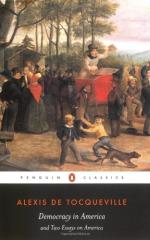
|
| Name: _________________________ | Period: ___________________ |
This test consists of 15 multiple choice questions and 5 short answer questions.
Multiple Choice Questions
1. De Tocqueville observes that judges are not elected, but are what?
(a) Endowed.
(b) Installed.
(c) Appointed.
(d) Called.
2. Historians in the United States believe that nations are driven by what?
(a) Particular individuals.
(b) Time.
(c) Collective events.
(d) Singular events.
3. The New World is considered to be what, geographically, to the rest of the world?
(a) To the East.
(b) Nearby.
(c) Isolated.
(d) To the West.
4. How is scientific research being driven in America at the time de Tocqueville is observing American democracy?
(a) Instant gratification is driving material research.
(b) Instant profits are driving scientific research.
(c) Industrial purposes are driving scientific research.
(d) Geniuses are driving scientific research.
5. In de Tocqueville's observations, aristocratic societies make countless _____________ available between man and God.
(a) Forces.
(b) Sources.
(c) Intermediaries.
(d) Methods of communication.
6. In a democracy, people take a special interest in the affairs of the state in order to do what?
(a) Participate in power and its outcomes.
(b) Participate in the political process.
(c) Be one of the people in power.
(d) Obtain a political position.
7. The right of political association originally came from where?
(a) Puritans.
(b) England.
(c) France.
(d) Colonists.
8. De Tocqueville believes that educated Americans read what type of literature?
(a) Scholarly.
(b) European.
(c) Relevant.
(d) Journalistic.
9. According to de Tocqueville, in America men obey what?
(a) Justice and laws.
(b) God.
(c) Divine authority.
(d) Secular authority.
10. De Tocqueville believes that there must be complete freedom of what?
(a) Speech and press.
(b) Press and religion.
(c) Speech and religion.
(d) Speech, religion, and press.
11. De Tocqueville believes that religion provides the people of America with a set of beliefs that does what?
(a) Goes without logic or explanation.
(b) Goes without justification or justice.
(c) Goes without justification or explanation.
(d) Goes without reason or explanation.
12. What type of regime did de Tocqueville study in America?
(a) Theocracy.
(b) Populacity.
(c) Democracy.
(d) Aristocracy.
13. De Tocqueville believes that the democratic writer has less to write about, but the writings are ________, when compared to aristocratic writings.
(a) Of greater need.
(b) Of greater importance.
(c) Of greater subjects.
(d) Of greater volume.
14. When were the first colonies established?
(a) Early 1600s.
(b) Early 1700s.
(c) Early 1500s.
(d) Early 1900s.
15. What is one of the best safeguards against potential tyranny of the majority in America?
(a) The judicial system.
(b) The media.
(c) The balance of power.
(d) The press.
Short Answer Questions
1. Compared to an aristocratic government ruled by an elite administration, democracy allows for what?
2. Democracy is a catalyst for what?
3. What does de Tocqueville say religion participates in keeping the social effects of on a leash?
4. According to de Tocqueville, governments typically perish because they lead their country into a state of anarchy or what?
5. The balancing act that the three branches of government perform on each other is referred to as what?
|
This section contains 458 words (approx. 2 pages at 300 words per page) |

|




